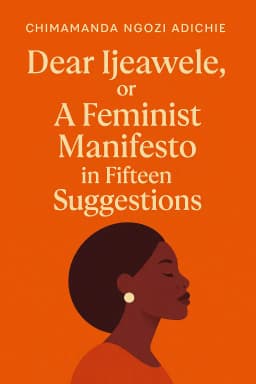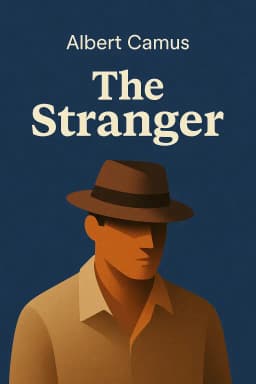
The Thinking Hand
An Inquiry into the Value of Work
Golden Hook & Introduction
SECTION
Michael: Your prestigious college degree might have made you less intelligent. We’re not kidding. Today, we’re exploring the radical idea that true brainpower isn’t found in the boardroom, but in the garage. Kevin: Hold on, less intelligent? My student loans would like a word. You're saying fixing a motorcycle could be better for your soul, and your brain, than writing a PhD dissertation? Michael: That's precisely the argument. We're diving into a book that became a massive sleeper hit for challenging exactly that assumption. It’s Shop Class as Soulcraft: An Inquiry Into the Value of Work by Matthew B. Crawford. Kevin: Shop Class as Soulcraft. I love that title. It's got this mix of grit and philosophy. Michael: And what makes this book so compelling is the author himself. Crawford has a PhD in political philosophy from the University of Chicago, but he walked away from a D.C. think tank to open his own motorcycle repair shop. He’s lived both lives. Kevin: A philosopher-mechanic! That's a combination you don't see every day. It immediately makes me wonder what he discovered in the garage that he couldn't find in the library. What was so wrong with the so-called "knowledge work" that he had to make such a drastic leap?
The Great Divorce: Why We Separated Thinking from Doing
SECTION
Michael: That question is the perfect entry point. Crawford describes his time as the executive director of a think tank as feeling profoundly useless. He was well-paid, respected, but he couldn't point to a single tangible thing he had accomplished at the end of the day. He felt his work was just creating abstractions, arguments that floated in the ether but never touched the real world. Kevin: I can definitely relate to that. The feeling of just moving pixels around on a screen, attending meetings about future meetings, and at 5 PM you close your laptop and wonder, "Did I actually do anything today?" Michael: Exactly. And Crawford argues this isn't an accident; it's a feature of how we've designed modern work. He traces it back over a century to something called "scientific management," or Taylorism. Kevin: Taylorism. That sounds like a 90s pop star, not a management theory. What exactly is it, and why should we care? Michael: Frederick Winslow Taylor was an efficiency guru in the early 20th century. His core idea was to separate thinking from doing. He believed managers should do all the thinking, planning, and problem-solving. The workers on the floor should just execute simple, repetitive tasks without any thought required. All the brain work, as he put it, should be removed from the shop. Kevin: So it’s about making workers into human robots. But wasn't that about efficiency? Making things like cars, with the Ford assembly line, cheaper and more accessible for everyone? Michael: That was the sales pitch. But Crawford argues it was more about control and cost-cutting. A skilled craftsman who understands the whole process is powerful and expensive. A line worker who only knows how to tighten one specific bolt is interchangeable and cheap. The result was what he calls the "degradation of work." Workers lost their autonomy, their skills, and the satisfaction of seeing a project through from start to finish. Kevin: Okay, I see it for the factory floor. But Crawford left a white-collar job. How does this apply to the modern office? Michael: Because that same logic has now invaded the cubicle. Think about it. Highly scripted customer service calls, complex software that dictates every step of a process, managers who just enforce rules they didn't create. The "thinking" is embedded in the system, and the "knowledge worker" is often just executing a pre-determined workflow. Crawford tells this story about a job he had as an "indexer and abstractor" for a database company. Kevin: That sounds impressively intellectual. Michael: You'd think! His job was to read academic articles and write short summaries. But he had a quota of twenty-eight articles per day. He realized the only way to meet the quota was to stop actually thinking about what he was reading. He had to suppress his own intellect to do his "knowledge work" job. It was a perfect example of the separation of thinking and doing, right there in a modern office. Kevin: Wow. So you can have a Master's degree and still be treated like an assembly-line worker, just for information instead of car parts. That’s… deeply depressing. Michael: It is. And it sets up the central question of the book: if this is what the "good" jobs have become, what have we lost by abandoning the so-called "bad" ones?
The Soul in the Machine: The Hidden Brainpower of Manual Work
SECTION
Kevin: Okay, so the office can be a soul-crushing void of abstraction. I'm sold. But what's so intellectually stimulating about fixing a bike? Isn't it just following a repair manual? Michael: That's the common misconception. Crawford argues that for a good mechanic, the manual is just the starting point. The real work is diagnostic, and it's a deeply intellectual process. He tells this beautiful little story about a customer picking up a repaired motorcycle. The bike arrived at his shop dead, in the back of a truck. After days of work, the customer gets on, starts it, and gives the throttle a quick, sharp twist. Kevin: The classic "BwaaAAAAP!" Michael: Exactly! And then it settles into that "blum-blum-blum" idle. Crawford says that sound isn't just noise; it's a form of communication. It’s the customer saying "thank you" and "job well done" in a language that both he and the machine understand. The mechanic has taken something broken and made it whole again. There is an undeniable, objective reality to that success. The bike either works or it doesn't. Kevin: Unlike a PowerPoint presentation, where its "success" is totally subjective. But what's the thinking part? Where's the brainpower? Michael: It's in the diagnosis. When an old bike comes in with a weird problem, there's no simple answer. The mechanic has to act like a detective. They form a hypothesis—"Maybe it's the carburetor, maybe it's a weak spark." Then they run tests. But it's not just about data. Crawford says a good mechanic relies on a "stock mental library of functional kinds, sounds, smells, and feels." They can tell by the scent of the exhaust or the specific rattle of the engine what might be wrong. Kevin: Wow, so it's a form of active, real-world science. You're not just executing a plan; you're in a conversation with the machine. It’s a sensory, intuitive process. Michael: Precisely. He calls these the "stochastic arts"—like medicine or mechanics—where things can go wrong for reasons you can't predict. You're dealing with systems you didn't create, and they are always throwing you curveballs. Failure is a constant teacher. This fosters a deep sense of humility. You can't just impose your will on the machine; you have to listen to it, to understand it. Kevin: That's a huge contrast with the corporate world, which often seems to reward baseless confidence. The person who sounds the most certain wins the argument, even if they're wrong. Michael: And that's why Crawford champions the virtue of "attentiveness" over "creativity." Our culture is obsessed with creativity, with disruption, with making your mark. But the mechanic's primary virtue is attentiveness—a quiet, selfless focus on the thing in front of you. It's about getting outside your own head and seeing the world, or the engine, for what it truly is. That, he argues, is the essence of "soulcraft." It's building your character through the act of paying attention. Kevin: I have to admit, there's a romance to it. But I also have to ask—is he kind of ignoring the downsides? This book was praised, but some critics pointed out that he focuses on the skilled, almost artistic side of mechanics. He doesn't talk much about the brutal, repetitive, low-paying manual jobs. Is he just cherry-picking the cool parts? Michael: That's a very fair critique, and the book does focus on the independent craftsman. He's not necessarily arguing that every manual job is fulfilling. His point is more that we've created a false hierarchy. We've dismissed an entire category of work that holds the potential for deep intellectual and moral engagement, and we've done so at our own peril.
The Tyranny of the Easy: Losing Agency in a World of Black Boxes
SECTION
Michael: And this way of thinking, this hands-on agency, is something we're actively designing out of our everyday lives, even for those of us who never go near a garage. Kevin: What do you mean? How so? Michael: Crawford points to the modern car engine. If you pop the hood of a car from the 1970s, you see the engine. You can identify the parts, you can see how they connect. If you pop the hood of a modern car, you see... a giant plastic cover. Kevin: The "black box." It's basically saying, "Nothing for you to see here, amateur. Close the hood and call a professional." Michael: Exactly. The inner workings are deliberately concealed. The same is true for our appliances, held together with bizarre, esoteric fasteners that require special tools. We are being systematically alienated from the objects we own. We've moved from a world of "things" to a world of "devices." A "thing," like an old hand-cranked egg beater, requires skill to use. A "device," like an electric mixer, just delivers a commodity—beaten eggs—at the push of a button. Kevin: And the device is a black box. If it breaks, you don't fix it, you throw it away and buy a new one. Michael: Right. And this erodes our sense of competence. Crawford tells this hilarious and infuriating story about an automatic faucet in a public bathroom. He stands there, waving his hands under it, trying to get it to work, feeling like he's "supplicating an invisible power." Kevin: Oh, I know that feeling! It's an irrational rage! You feel completely helpless, and honestly, a little stupid. Michael: But Crawford says that's the point! The faucet is designed with the presumption that you are too irresponsible or too unhygienic to be trusted with a simple handle. It infantilizes you. And that small moment of lost agency, repeated thousands of times with all the devices in our lives, adds up. It teaches us to be passive. Kevin: It's so true. Our phones, our smart homes, our cars... we don't really own them in the old sense. We're just users. We don't know how they work, and we certainly can't fix them. We are dependent on the experts, on the corporations that made them. Michael: He even points to things like the Build-a-Bear store. It's marketed as "making your own" teddy bear, but the child's agency is reduced to selecting from a menu of pre-determined options on a screen. The actual making, the sewing, is done for them. He argues this is training for a life of passive consumption, where "freedom" just means choosing from a list of options someone else created for you. Kevin: That's a chilling thought. We think we have more choices than ever, but we might have less real agency than ever before. We've traded competence for convenience.
Synthesis & Takeaways
SECTION
Michael: We have. And that really brings us to the core of the book. It’s a powerful critique of a culture that has forgotten the value of tangible reality. Kevin: So what's the big takeaway here? Should we all quit our office jobs and become carpenters or plumbers? Michael: I don't think that's the message. It's not about everyone becoming a mechanic. It's about recognizing the profound value of tangible competence and reclaiming a sense of agency in a world that increasingly wants us to be passive consumers. The book is a call to be a master of your own stuff, to understand the world you inhabit, not just use it. Kevin: So it's a mindset shift. It's about finding the "shop class" in our own lives, wherever that may be. Michael: Exactly. It could be learning to cook a meal from scratch instead of ordering takeout. It could be learning a little bit of code to build a simple website instead of using a template. It could be fixing a leaky faucet, tuning your own bicycle, or tending a small garden. These activities connect us back to the real world. They have objective standards of success—the meal is delicious or it's not, the code works or it doesn't, the plant lives or it dies. Kevin: That's a powerful idea. It's not about a specific job, but about an approach to life. It's about fighting back against the black boxes and reclaiming a little piece of your own competence. Michael: It really is. The book leaves you with a profound question, one that I think is more relevant now in the age of AI than it was in 2009. It challenges you to look at your own life and ask: where have I outsourced my own thinking? Where have I given up my agency for the sake of convenience? Kevin: That's a question that could keep you up at night. And it's a great one for our listeners. We'd love to hear from you. What's one skill you've learned, big or small, that gave you that incredible feeling of real, tangible competence? Let us know on our social channels. We're always curious to see how these ideas land in the real world. Michael: This is Aibrary, signing off.









